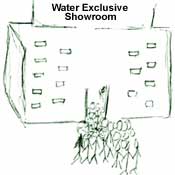| |
|
PERSPECTIVE |
|
| National water policy A futile
exercise |
|
IN FOCUS |
|
| Water riots breakout in Gujarat Bustards under threat Disappearing lakes and ponds |
|
INITIATIVE |
|
| Delhi prepares to catch rain Watering schools Ready to take action Gokak goes green Journalist's meet |
|
TECHNOLOGY |
|
| Easy steps to catch rain |
|
CSE'S LATEST DESIGNS |
|
| Sankat Mochan Mandir A role model in the making |
|
CHENNAI PAGE |
|
| Water suficient Municipal water bonds Active campaigner |
|
PROFILE |
|
| Water crusader |
|
TRADITION |
|
| Kata system |
|
NEWS FROM ABROAD |
|
| A water conscious city Ghana's privatisation woes |
|
OBITUARY |
|
| Vilasrao Salunke |
|
BOOK / DOCUMENTS |
|
| Glimpses of book |
|
EVENTS |
|
| Conference call |
|

| Vol. 4 | No. 2 |
April 2002 |
Watering schools
Where does water come from?From our taps, of course!
This is how most of the water workshops organised by the Environment Education Unit of CSE with students begin. The participants are introduced to the various aspects of water supply. First, they are introduced to the traditional rural water harvesting systems prevailing in our country. It is a long journey from there to the johads (earthen check dams) of Alwar, Rajasthan and to the pynes (channels constructed to utilise the water flowing through the numerous hilly rivers) of Bihar.
Boondh boondh bachao, Paani ko forever banao!
"When I got the information about
this workshop, I thought that this may be, as usual – an ordinary gathering of
people, where the officials may come and say something and go back. But I was wrong. I,
for the first time realised the importance of water. What is water? Water is life." Pragya Tiwari,
Class – VIII E "We don’t really think about its (water) misuse when we use it. Everyday we use it in our lives. If we don’t conserve water today, our future would be something like this…." "Don’t let this
happen!"
Harshita Agarwal, Class
– VIII B "When drops combine, ocean is formed. When each one saves water, a developed India is formed." Shubhra
Chaturvedi, Class – IX B "If we look upon the amount of water, we have a good history. But, if we waste it, in future it will just be misery." Anand Kirti, Class VIII "Care for water, as you care for your child. Give your future, a glass full of pure nectar of life." Samriah
Maurya, VIII B "Believing in god means observing nature with a concern. Writing about this alone will not make a change. Change is the effect of action. If you want to change, just change your habits, Rest will itself change. Change your water consumption.You will make a change in today’s problem of water." Preeti, Class IX A |
The students are then introduced to the water situation prevailing in urban India. The reasons for the rapidly depleting groundwater tables and water pollution are explained. Problems arising out of sharing water unequally and water pricing are discussed. The ‘polluter pays’ concept is explained. At the end of this colourful yet informative journey, students begin to realise that there is enough water, it just needs to be managed well.
Experiences from the schools of Delhi is overwhelming. Workshop organised with Akshay Pratisthan, a rehabilitation and education centre for disabled persons drew a terrific response.
In January, the Banyan Tree, a Varanasi-based NGO brought 500 students from schools across Varanasi, Uttar Pradesh together for a water workshop. In this they were helped by CSE. During this workshop, students expressed their understanding on water through pen and colourful paints. (see box: Boondh boondh bachao, Paani ko forever banao!) In April, forty schools from all over Varanasi participated in the workshop organised by CSE. A water harvesting exercise was taken up by the students. They calculated the water harvesting potential of Rajghat Besant School and actively drew up the plan of action.
In Jaipur, Rajasthan students from five schools got together to grill the chief minister and the mayor on the present water situation. Click, snap, write and voila, these kids had a special edition on Jaipur environment with them.
The list is endless of students joining in, to take this campaign forward. What needs to be done now is to harness this energy and to translate it into actors.
For further information:
Rhinusmita
EE Unit, CSE,
41, Tughlakabad Institutional Area, New Delhi 110 062
Tel: 6081124, 1125 Ext. 227
Email:rhinu@cseindia.org

 "By attending this workshop, I
have learnt the importance of water. We should always try to save it ourselves, while also
encouraging others to do the same. It has been found that Indians were the world’s
greatest water harvesters. In different places, people save water in different ways like
in Rajasthan people make cup and saucer kind of structures (like, kundis). Water is
a collective decision locally made. Flame of life burns with water just as flame of school
burns with teachers."
"By attending this workshop, I
have learnt the importance of water. We should always try to save it ourselves, while also
encouraging others to do the same. It has been found that Indians were the world’s
greatest water harvesters. In different places, people save water in different ways like
in Rajasthan people make cup and saucer kind of structures (like, kundis). Water is
a collective decision locally made. Flame of life burns with water just as flame of school
burns with teachers."